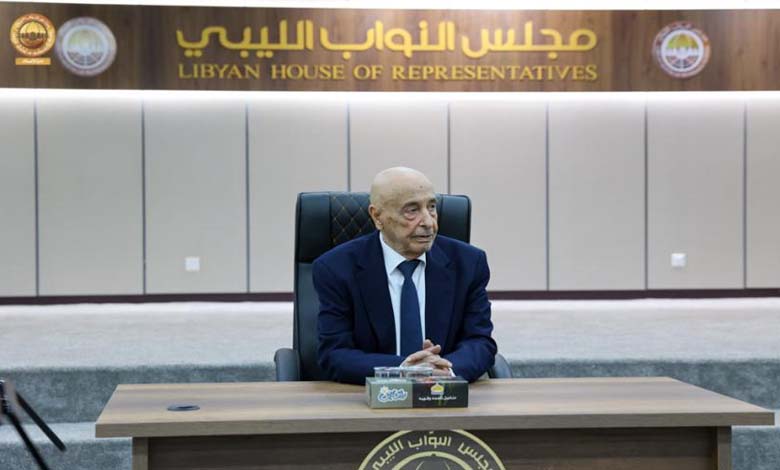A New Crisis in Libya Impedes Negotiations for Forming a Unified Government
The High Council of State expresses its rejection of Aguila Saleh's announcement to open candidacy for the presidency of a unified government.

On Sunday, the High Council of State in Libya expressed its rejection of the announcement by the Speaker of the House of Representatives, Aguila Saleh, to open the candidacy for the presidency of a unified government for the oil-rich country. This stance points to new disagreements that could negatively impact the recent progress made in political negotiations to resolve the country’s crisis and unify its institutions.
Earlier on Sunday, Saleh announced the opening of candidacy for the position of Prime Minister of a unified government, starting from today until August 11th, calling on the “Presidency and members of the High Council of State (a consultative parliamentary body) to nominate those they deem competent for the position of Prime Minister.”
In response to this move, the High Council of State stated in a declaration, “Consensus and non-unilateral decision-making is what we have sought to achieve, and we laid down its fundamental points in the tripartite meeting under the auspices of the Arab League in its general framework.”
On March 10th, Saleh met in Cairo with the President of the Libyan Presidential Council, Mohamed al-Menfi, and the President of the High Council of State, Mohamed Takala, under the auspices of the Arab League, to resolve disputes preventing the long-awaited general elections.
The three council leaders agreed on a path that includes “forming a unified government tasked with overseeing the electoral process, providing necessary services to citizens, and unifying sovereign positions,” according to a statement by the Arab League at that time.
According to the High Council of State on Sunday, this path “was supposed to be completed by setting the mechanisms related to all the points included in the statement.”
However, the council added, “The unilateral step taken by the House of Representatives (based in the east) by approving a massive budget in violation of the political agreement, which perpetuates division, prevented the meeting (to establish mechanisms) from happening.”
On July 10th, the House of Representatives approved a unified budget for the country amounting to 179 billion dinars (about 25 billion dollars), which Takala denounced, announcing the suspension of his participation in the dialogues sponsored by the Arab League to resolve the Libyan crisis.
In its statement, the High Council of State emphasized its “commitment to the general framework for a political solution included in the tripartite statement in Cairo, which did not agree on the mechanisms for implementing its provisions, including the mechanism for forming the government,” calling on the House of Representatives to “refrain from continuing to take unilateral steps that would repeat failures and perpetuate the state of division.”
-
Aguila Saleh in the Eid speech.. The achievements of the Libyan parliament and the failures of Dbeibeh
-
Mohammed el-Menfi intensifies pressure on Dbeibah by criticizing spending file
Until there is an agreement on the mechanisms, the council affirmed that it “will not recognize any unilateral action,” referring to the House of Representatives’ announcement of opening the candidacy for the presidency of a unified government.
Currently, there are two governments in Libya: one recognized by the United Nations, the Government of National Unity led by Abdul Hamid Dbeibah, based in the capital Tripoli, overseeing the entire west of the country; and the other, led by Osama Hamad, appointed by the House of Representatives three years ago, based in Benghazi, overseeing the entire east and some cities in the south.
-
EU removed Aguila Saleh from its sanctions blacklist
-
Saleh, al-Mishri meet in Cairo for Libyan elections
This situation has created a political crisis that Libyans hope to resolve through presidential and parliamentary elections, hindered by disagreements over their laws and the executive authority that will oversee them.












